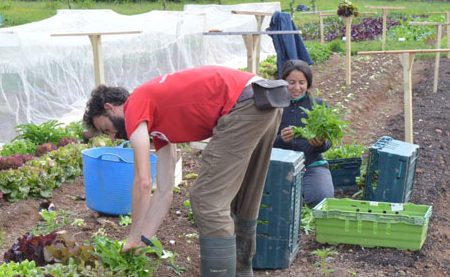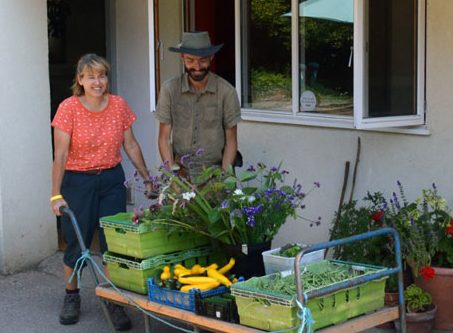Training and support for the future of agriculture and agroecology
- Like
- Digg
- Del
- Tumblr
- VKontakte
- Buffer
- Love This
- Odnoklassniki
- Meneame
- Blogger
- Amazon
- Yahoo Mail
- Gmail
- AOL
- Newsvine
- HackerNews
- Evernote
- MySpace
- Mail.ru
- Viadeo
- Line
- Comments
- Yummly
- SMS
- Viber
- Telegram
- Subscribe
- Skype
- Facebook Messenger
- Kakao
- LiveJournal
- Yammer
- Edgar
- Fintel
- Mix
- Instapaper
- Copy Link
Posted: 12 October 2020 | Caroline Aitken | 1 comment
The United Nations Food and Agriculture Organization advocates a widespread transition to agro-ecological farming in order to meet the 2030 Sustainable Development goals. But we can only achieve this if we change the way we educate the next generation of farmers and producers, writes Caroline Aitken.


TEN years is like the blink of an eye for the agricultural industry. The challenges we have seen this year arising from the COVID-19 pandemic have shown us that farmers and producers can be resilient in difficult times. They can change.
And in the next 10 years we can expect more drivers for change to come from many directions; Brexit, environmental concerns, as well as the potential impact of future pandemics. At the other end of the food system these drivers are influencing consumer behaviour too, creating a shift in food culture that supports local sustainable farming and ethical food businesses.
The Bray Leino 2020 Food and Drink Report found that: “Locally sourced, Fair Trade, and organic are increasingly important labels (to consumers) when buying food.”
Farmers markets, delivery schemes and producer hubs have proliferated in recent years, competing with supermarkets on convenience, cost and choice. So, while nationwide we have seen a decline in medium- to large-scale farms, small farm businesses have been growing steadily for the last 15 years.
Community Supported Agriculture schemes (CSA), such as School Farm in Dartington, UK, add a degree of security for the producer due to the advance investment from customers, who have a stake in a good, local supply of high-quality food. Another example is Growing Communities in Hackney, UK, which supports a ‘patchwork’ of small urban and peri-urban food producers.


Sustainable salad cropping
This kind of innovation is bringing change from the ground up; these new enterprises are not waiting around for legislative support and subsidies. Yet, they agree there is a lack of available training for new entrants to this non-conventional approach.
This new interest in agroecology needs to be supported with more provision of knowledge and skills. So, while Government support and incentives would undoubtedly make transition easier for most farmers, the importance of training and education cannot be understated.
In 2017 I carried out extensive research and consultation, on behalf of Schumacher College in Devon, regarding the current educational provision for regenerative food and farming in the UK, which revealed large gaps in both further and higher education.
Most UK courses focus primarily on conventional (large scale, chemical, specialised and mechanically intensive) practice and markets (supermarkets, global commodity markets), with sustainable practices and markets either not mentioned at all, or perhaps offered as an optional add-on to a standard course.
Learning how to deal with supermarkets may be important for many farm businesses, but it’s not the only option and it leads young farmers into a challenging and fragile marketplace and often away from the agro-ecological transition.


Farmers markets, delivery schemes and producer hubs have proliferated in recent years
Consequently, those drawn to working in sustainable agriculture are relying on short courses and personal study which tend to focus on specific practices rather than looking at principles and approaches.
I found many new entrants to sustainable food and farming are non-agriculture graduates and career changers drawn to the lifestyle, culture and ethics of the movement.
Many had gained practical skills through volunteering, working on farms or taking short courses, but they struggled to gain the requisite skills to set up and run a successful small farming enterprise.
Many cited this as their biggest challenge and some as a reason for failure.
Small mixed farming is a highly knowledgeable and skilled profession, and business skills are key to success, especially when looking to access local markets in innovative ways.
At Schumacher College, we have launched the UK’s first undergraduate degree in Sustainable Food and Farming – dedicated to training up a new generation of agro-ecological farmers and ethical food entrepreneurs.
The College, part of the Dartington Trust, is set on the 1,200 acre Dartington Estate, close to the Transition Town of Totnes, where students will be able see theory in action and have the opportunity to learn from food and farming pioneers.
As 2030 rapidly draws closer, educators must respond to the needs of new entrants to food and farming. Last year, after wide consultation, the RSA Food Farming and Countryside Commission created a 10-year transition plan.
The French Ministry of Agriculture has set a target for France for 2025 and it has called on other EU nations to follow suit.
The growing network of small mixed farms using regenerative methods and serving local communities is the seed of transition, and now is its time to grow; the small guys are the big picture.
The choices we make in the next decade will determine the future health of our landscape, the biosphere and our economies; as well as the food security of our family and communities, and thousands like them around the globe.
About the author
Caroline Aitken runs Whitefield Permaculture, a land design and education consultancy based in the south west of England. She teaches and speaks at farms, colleges and venues around the country, including Schumacher College where she co-developed the new BSc Sustainable Food and Farming.
Caroline co-authored Food from your Forest Garden with Martin Crawford (Agroforestry Research Trust) and writes about permaculture and regenerative agriculture. Her design work is based upon the principles and frameworks of permaculture and agroecology.
Related topics
Environment, Food Security, Research & development, Supply chain, Sustainability, Trade & Economy
Related organisations
Dartington Trust, Growing Communities, RSA Food Farming and Countryside Commission, School Farm, Schumacher College, The French Ministry of Agriculture










It is true and wise that training and support of future farmers will play an important role to meet the 2030 sustainable development goals. We will be able to achieve that goal by working together, sharing knowledge and involve our youth so that they grew up knowing that Farming is the pillar of us all. Regards.